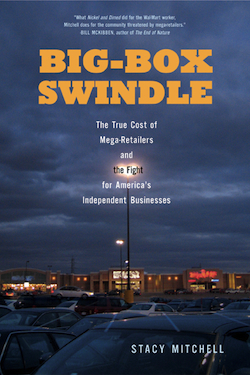A survey of over 100 independent retailers in New England has found that almost all (98%) would like to source more of their inventory from manufacturers and other producers within the region. But there are barriers to doing so, including, most notably, a lack of an easy and efficient way for retailers to identify New England companies producing the kinds of goods they carry.
The survey, conducted by the New England Local Business Forum and the Institute for Local Self-Reliance, gathered data from 109 independent retailers. Most (87%) operate only a single location. They average just under 8 full-time employees. All are actively involved in "buy local" and "local first" campaigns that urge people to choose local, independent businesses. Being involved in these initiatives may have increased their own interest in purchasing more of the goods and services they need to run their businesses from other local businesses in the region.
Major findings of the survey include:
- Although the survey included retailers carrying a wide variety of goods, it had heavier representation in certain categories and an outsized number of retailers who also make the goods they carry (e.g., jewelers). Respondents reported that an average of 24% of their merchandise was made in-house and 23% was purchased from producers within New England.
- Among retailers who source or produce at least 20% of their merchandise in New England, the top product categories were: groceries, art, jewelry, clothing, furniture, pet supplies, and toys.
- The 13 grocers and specialty food stores in the survey reported that 62% of the food they sold was produced in New England.
- Among those who sourced very little in the region, the top product categories included: shoes, books, appliances, clothing, music CDs, pharmaceuticals, housewares, and toys.
- Scale appears to be a factor in the degree to which retailers source from local and regional producers. The smallest retailers – those spending less than $250,000 a year on inventory – source 51% of their goods from New England producers. Larger retailers – those buying $1 million or more a year in inventory – source only 21% of their goods within the region.
- Of those retailers who already source at least 20% of their merchandise in New England, 50% indicated that a primary barrier to sourcing more from the region was the lack of an easy and fast way to identify New England manufacturers that produce the goods they carry. Other barriers cited included that the goods they carry are not produced here (37% report this barrier) and small producers often fail to meet standard wholesale practices regarding payment terms, delivery, order-taking, etc. (27%). (Respondents could select more than one barrier.)
- Of those firms that purchase a majority of their merchandise from large national or global companies, 80% said the biggest barrier to sourcing in New England is that the goods they sell are not made here. Other factors include the difficulty of identifying regional manufacturers and higher prices for goods produced in New England.
- When asked what would help them source more goods regionally, 55% of the respondents indicated that a website showcasing regional producers and facilitating wholesale orders would be helpful. Just under half (49%) said that assistance identifying producers of the goods they stock would be helpful, and 44% voiced support for a tradeshow of New England manufacturers.
The New England Local Business Forum is a coalition of more than a dozen local business alliances, representing about 3,000 independent businesses in six states. NELBF serves as a resource for the growth and development of these organizations, and promotes support for independent businesses across the region.
The Institute for Local Self-Reliance is a national nonprofit organization that conducts research and provides innovative strategies to support environmentally sound and equitable community development. Among its programs is the New Rules Project.
Additional information about the survey and the results can be found here.



